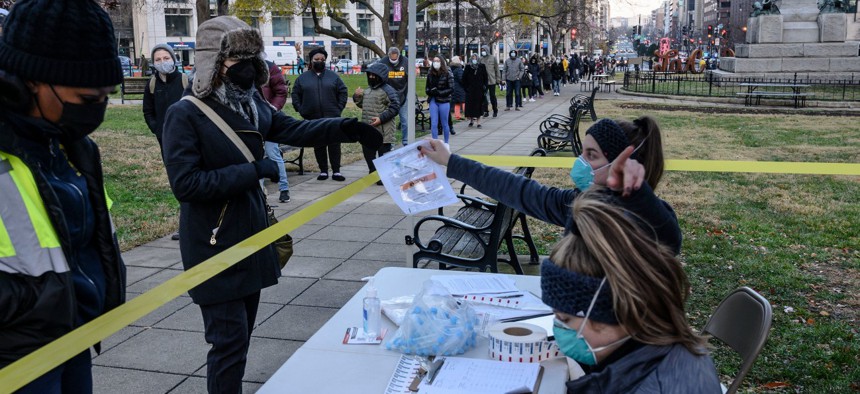
People queue up at a Covid-19 testing site in Washington DC, on December 22, 2021. PEDRO UGARTE/AFP via Getty Images
More Than 2,000 Feds Deployed As Biden Administration Looks to Fight Omicron Surge
Meanwhile, some agencies start returning to maximum telework after previously bringing employees back.
The Biden administration has deployed 2,100 federal personnel around the country as it ramps up its response to the Omicron variant of COVID-19, adding testing and hospital capacity in conjunction with skyrocketing cases.
That number is likely to increase significantly in the coming days with the administration planning to set up more federally run testing sites and promising to meet the requests of every governor. In addition to the staff deployments, the federal government has paid for states to deploy 13,000 National Guard members to assist in pandemic response efforts. And even as they send personnel around the country, federal agencies are looking to reduce the spread within their own workforces by sending more employees home.
The administration is making assessments on its deployments on a community-by-community basis, looking at where the biggest needs are for testing capacity, hospital personnel, vaccinations and treatments. Last week, the Federal Emergency Management Agency sent 60 workers to New York to provide medical support. FEMA has also helped set up nine federally run testing sites in New York City—an initiative President Biden announced last week—with more opening on Sunday. In the coming days, the administration will set up federal testing sites in New Jersey, Philadelphia and Washington, D.C., Jeff Zients, the White House’s COVID-19 response coordinator, announced on Wednesday. FEMA paramedics are arriving soon in Arizona, with other federal personnel, including U.S. Public Health Service staff, deploying in the coming days to New Mexico, Indiana and Wisconsin.
Zients promised to get additional federal workers wherever they are needed.
“Our message to governors is simple,” Zients said. “If you need something, say something, and we will mobilize quickly to get you what you need.”
He emphasized that federal agencies would not let up in their efforts to help states.
“We’ve been working around the clock to surge reinforcements to communities as they battle Omicron, helping to staff hospitals, administer monoclonal antibody treatments to patients, add testing capacity and get more PPE where it’s needed,” Zients said, “and you’ll see us continue to act aggressively in the days and weeks ahead to address communities’ needs.”
He added that aggressive attacks against National Institute of Allergy and Infectious Diseases Director Anthony Fauci were “unacceptable, saying Fauci and “the whole team of public health professionals in the federal government” are “extraordinary public servant[s].”
As agencies look to protect those public servants, some are again ensuring as many as possible remain away from the workplace. The White House said this week that every agency has to make its own decisions on who reports to work in person, with decisions based on "operational considerations." The Defense Department, for example, cited the recent spike in COVID-19 cases in the Washington region in implementing on Tuesday new restrictions for in-person work at the Pentagon.
The department advised supervisors and managers to "strongly encourage" maximum telework through January, banned unofficial visitors and limited official visitors to mission critical meetings and set occupancy rates at no more than 40%. In the summer of 2020, the Pentagon lifted its occupancy maximum to 80% of normal capacity. The building is closing the seating in its food court and the department is requesting that all meetings take place virtually when possible. Defense reiterated that all personnel and their families should receive a vaccine booster, get tested "upon return home from the federal holiday period" before coming into the office and monitor themselves for symptoms. The Pentagon Health Clinic will resume offering vaccinations on Jan. 5.
Those steps, the department said, would “protect the workforce, their families, our communities, and our support to the no-fail mission of the Department of Defense.”







